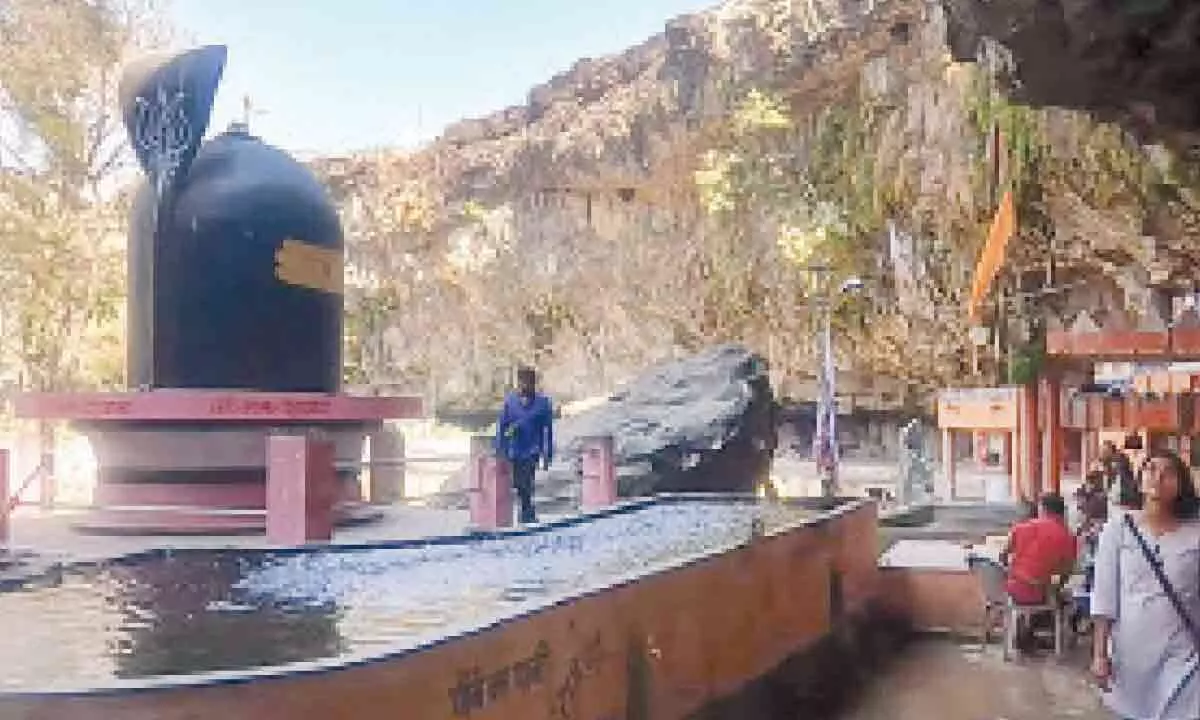Pratapgarh: Raj temple’s ‘Paap Mukti’ certificate for a dip in ‘kund’

Details of when the practice began are unavailable but it is said that those who have committed the “sin” of deliberately or non-deliberately killing an animal or have been boycotted by their caste or community seek to get a certificate after a dip in the ‘kund’
Pratapgarh : Scores of pilgrims across the country take a dip in rivers considered holy with a firm belief that their sins would be washed away, but a temple in southern Rajasthan officially validates that a dip in its ‘kund’ would liberate a person of any sin.
For this, a ‘Paap Mukti’ certificate is issued for Rs 12. Gotameshwar Mahadev Mandir, famous as the Haridwar of Vagad, is in Pratapgarh district, nearly 450 km from the state capital, Jaipur. The certificate is issued by the temple trust which comes under the Devasthan department of the state government. However, the number of certificate seekers is limited and around 250-300 certificates are issued in a year for a dip in the temple’s ‘Mandakini Kund’. Details of when the practice began are unavailable but it is said that those who have committed the “sin” of deliberately or non-deliberately killing an animal or have been boycotted by their caste or community seek to get a certificate after a dip in the ‘kund’.
The certificates then act as evidence that they do not carry any “sin” on their head, and that the boycott be revoked. The certificate from the temple reads, “The ‘panchs’ of the villages (members of panchayat) should know that this person took a bath in ‘Mandakini Paap Mochini Ganga Kund’ of Shri Gotameshwar ji, which was built so that people could atone for their sins.
Therefore this certificate has been provided. Please accept him/her back into the caste society.” Local sarpanch Uday Lal Meena said that a certificate is issued for Rs 12 with the signature and seal of ‘Amin’ (patwari or revenue department personnel) who sits in an office near the ‘Paap Mochini Mandakini Kund’.- “It is believed that famous Hindu sage Mahirshi Gautam was absolved of the sin of killing a cow after taking a dip here. The tradition is being followed and it is a firm belief that those who take a dip in this ‘kund’ become free of their sins,” he told PTI. “Usually, insects or other creatures get hurt or killed during farming, or bird eggs are destroyed which is taken as sin,” he said.
However, he refrained from talking about other reasons people are boycotted from castes or communities. The temple is dedicated to Lord Shiva and it is said that Mahmud of Ghazni attacked the temple and tried to destroy the ‘shivlinga’ but swarms of bees came out of it and Ghazni’s men were attacked. “Ghazni then rebuilt the temple.
The ‘shivlinga’ is damaged but still worshipped. Thousands of people visit the temple every month, particularly in the holy month of Sawan, and on Mondays,” Vikas Sharma, one of the priests at the temple said. He said that since it was difficult to reach the temple in earlier times due to its topography, people did not believe that one has taken a dip in the ‘kund’. “In such a situation, a certificate is proof that the person has taken the dip,” he said.
Ghanshayam Sharma, another priest, said that tribal people immerse ashes after the funeral of their family members in the ‘kund’ and therefore it is called the ‘Haridwar of Vagad’. Pratapgarh, Banswara district and nearby areas are called as Vagad. Sharma said tribals from the state and from neighbouring Madhya Pradesh come to this temple.



















